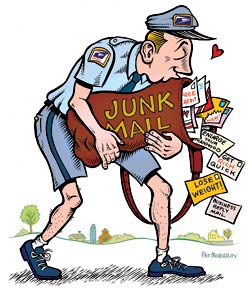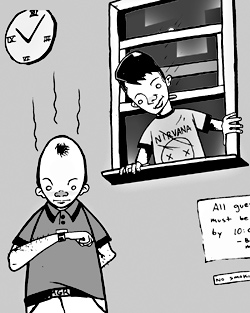Like the leaves that clog ourgutters every fall, or the grass that never stops growing, junk mail is an extension of nature that requires constant pruning. Most of us have become so attuned to the daily promises of cheaper cable service and low fixed APRs that we can fling most mass mailers into the trash with nary a fear of discarding something vital.
But state legislators are questioning whether AOL disks and pizza coupons should be included in our daily mail-fetching routine at all: Last Thursday, Sen. Jeanne Kohl-Welles, D-Seattle, urged her fellow lawmakers at a Senate Consumer Protection and Housing Committee hearing to pass a law creating a “Do Not Mail” registry. The state-maintained database–which would be the first in the nation–would allow residents to opt out ofreceiving all junk mail. Any business that advertises through the mail to Washing-tonians would have to put systems into place to keep the right people out of the loop.
As the bill stands, violators would face a $2,000 fine per offense. Only charities, political campaigns, and organizations that have existing relationships with clients would be allowed to send direct mail to people on the list.
“It gives individuals the opportunity to [opt out] who are very disturbed about the amount of mail that they think is junk mail,” says Kohl-Welles.
Last fall, the Maryland-based Center for a New American Dream asked one of its Seattle contacts, Brad Hole, to lead an effort to purge Washington of unwanted bulk mail. Hole, a Ballard resident who runs an enviro-friendly office supply business, agreed to rally legislative support for the Maryland group’s cause.
“I didn’t know much about it going into it,” says Hole. “I get junk mail like everybody else. It’s a pain.”
New American Dream failed to get similar measures passed last year in Missouri, Illinois, and New York. All three died in committee. This year, in addition to Missouri and Washington, they’re working on legislation in Colorado, Maryland, Michigan, and Texas.
At Thursday’s hearing, Kohl-Welles rattled off some statistics that she thinks prove how diabolical junk mail is: hundreds of millions of dollars spent per year to dispose of mail that doesn’t get recycled; California spending $500,000 per year to pitch the aforementioned AOL disks; a National Park’s worth of trees every four months stuffed into American mailboxes in the form of QFC circulars and Bed Bath & Beyond coupons.
It’s tough to argue with the logic of Kohl-Welles’ bill, except when you consider what’s at stake for the opposition: jobs, as well as significant salary reductions for rural mail carriers. “We depend on bulk business mail,” says PatriciaAlexander, president of the Washington Rural Letter Carriers Association, which has about 2,000 members in the state.
Alexander, who delivers mail to 700 customers on the Lummi Indian Reservation near the Canadian border, worries that she could be forced to take a pay cut of up to $10,000 per year if the registry went into effect. That’s because rural carriers, unlike their metropolitan counterparts, get paid based on volume rather than the number of hours they work. Every year, an alternating sample of two or four weeks is conducted to count the number of pieces delivered on each route, determining the salary for the following year; the greater the number, the higher the salary. So for folks like Alexander, opposition to a Do Not Mail list is a no-brainer.
Kohl-Welles says that it “would absolutely be the case” that the bill will haveto be changed in order to accommodatethe needs of labor. “It puts me in a real dilemma,” she acknowledges. “You can’t go forward with environmental issues because of concerns…you have to balance.”
Alexander’s husband, Charles, also a rural carrier and state steward for the rural carriers’ union, says that the registry would also create needless headaches that would drive up mail rates. “The postal service would be in a situation where they’ll likely have to pay more to deliver something they’re receiving less revenue on,” he says.
Flyers that don’t carry specific addresses are cheap for businesses to send out because they don’t have to be sorted by destination; the carrier just has to drop one in each box. But if Kohl-Welles’ law is enacted as written, carriers could have to bring a list of all the people on their routes who opted out of receiving the flyers. Or perhaps the flyer classification would be eliminated altogether, necessitating that all pieces of mail be addressed and sorted, thus raising rates for businesses.
But therein lies an interesting twist: Rural carriers’ pay is also determined by how much they handle the mail. The more processing that’s involved, the more money they get.
“Their concern is they’re going to run out of work as a result of this, right?” says attorney Dan Fiorito, who testified alongside Hole before the Senate Consumer Protection and Housing Committee. “Well, that might make them actually do more work.”
Fiorito, also a Ballard resident and a close friend of Hole’s, says it would be up to the state attorney general to determine if companies doing blanket mailings were violating the statute. But if such mailings weren’t prohibited, it would leave the law with a loophole big enough to drive a logging truck through, cutting off its purpose at the roots.
A Feb. 2 e-mail sent to Jacob White, counsel for the Senate consumer protection committee, from Steve Larsen at the attorney general’s office outlines several scenarios that would undermine the proposed law: the exemption for pre-existing business-client relationships, offers such as sweepstakes that open people up to being marketed to, and federally regulated credit card offers that he says the state cannot interdict.
“There are just too many ways that the mail will get there even if there is a do not mail list,” Larsen writes.
Steven Krieger, New American Dream’s grassroots coordinator and community liaison, says that database tools for the list will be able to solve most of these issues, before adding: “Let the consumers and direct mailers sort through this.”
Currently, the Direct Marketing Association, an industry group that represents about 4,000 U.S. companies, offers its own Do Not Mail list to consumers. “[The list] can reduce mail people get by up to 80 percent,” says DMA spokesperson Stephanie Hendricks.
On its Web site, DMA also lists a toll-free number for opting out of credit card offers. “There are a lot of options out there that aren’t ‘Stop sending me everything,'” Hendricks adds. “It could potentially hurt local businesses.”
But Hole argues that the state-run Do Not Mail list could save businesses money, as companies wouldn’t waste funds mailing to people who don’t want their products. Instead of sending out flyers to everyone, Hole urges businesses to “do a little research [and] get creative.”
The Direct Marketing Association testified against Do Not Mail at the Olympia hearing last week. No surprise there: DMA also fought against the federal government’s Do Not Call registry, a tool implemented in 2003 that allowed millions of Americans to sit down to dinner without being interrupted by telemarketers forthe first time in years. On this front, theIndianapolis-based American Teleservices Association says that the number of contact center employees in the U.S. is currently at 5.2 million–but if Do Not Call hadn’t been implemented, it would be around 6.5million. ATA also says that a quarter-million telemarketers were laid off “immediately” after Do Not Call went into effect.
“Citizens have the right to post a ‘No Soliciting’ sign on their doors, turn off the TV and radio when unwanted ads come on, and sign up for the popular Do Not Call telemarketer registry,” says a letter Hole sent to the Senate consumer protection committee chair, Brian Weinstein, D–Mercer Island. “Shouldn’t we have the right to opt out of junk mail with an easy-to-use Do Not Mail registry?”
But not everyone agrees that junk mail creates the same headaches as telemarketing calls. Drew Von Bergen, spokesperson for the National Association of Letter Carriers, the Washington, D.C.–based union for delivery workers, sums it up like this: “In telemarketing, they seem to annoy you when you’re sitting down to dinner. You don’t have to jump up in the middle of a meal and open up your mailbox.”








